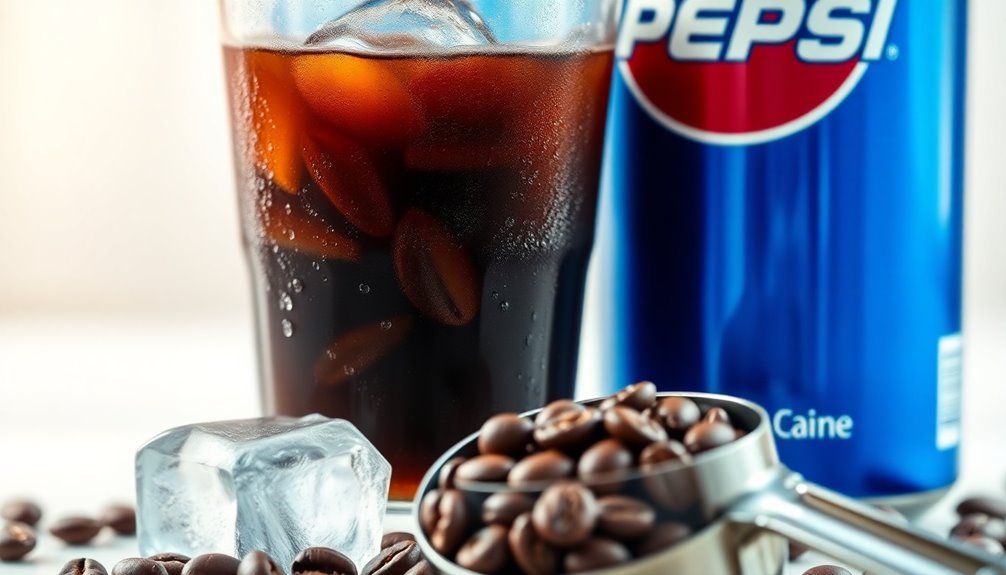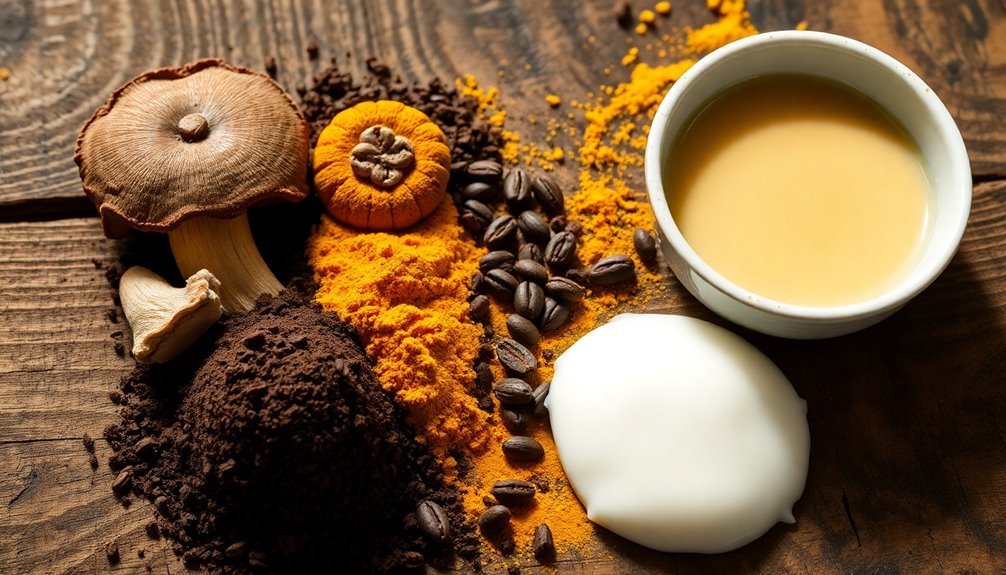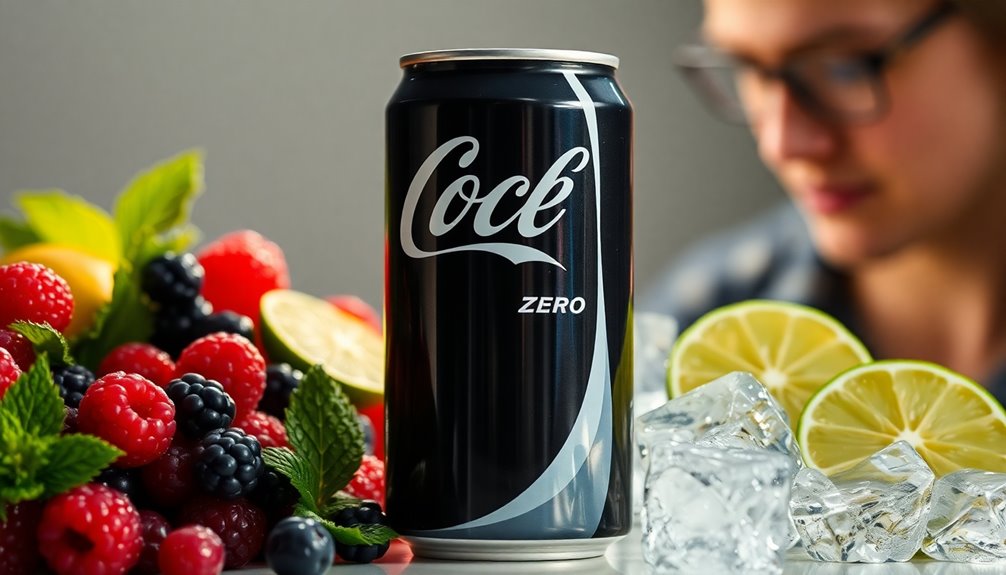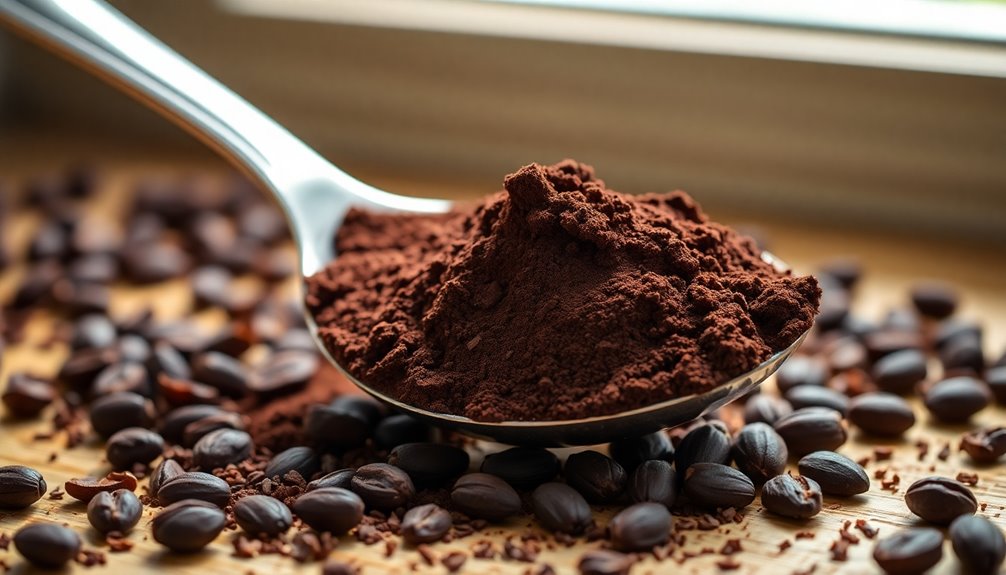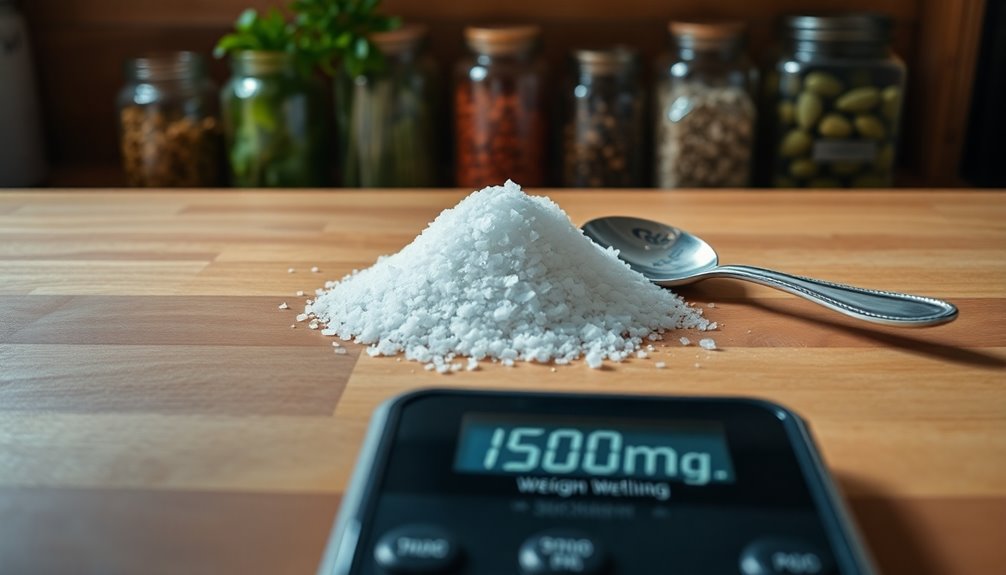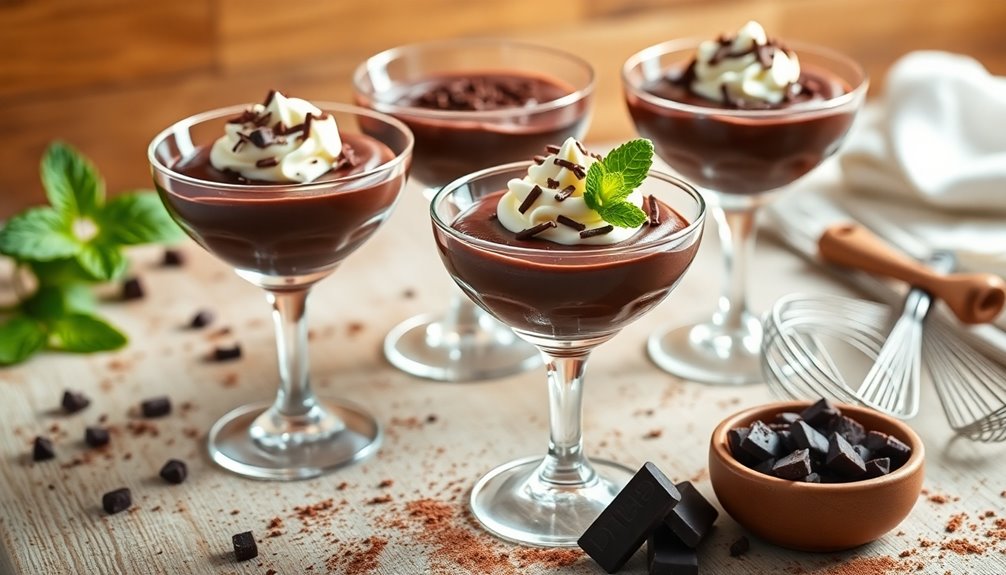You might be surprised to learn that a standard 12 oz serving of Pepsi contains about 33.9 mg of caffeine. That's considerably less than many energy drinks and even some other sodas. While you may expect more, it's essential to recognize that this amount is still within safe limits for regular consumption. In fact, many cola beverages hover around this caffeine level. Understanding the caffeine content is key to making informed choices for your health. If you're curious about how Pepsi compares to other drinks and what this means for your caffeine intake, there's plenty more to discover.
Key Takeaways
- A standard 12 oz serving of Pepsi contains approximately 33.9 mg of caffeine, comparable to Coca-Cola's caffeine content.
- Different Pepsi products, like Pepsi One, have varying caffeine levels, with Pepsi One containing 57 mg per 12 oz serving.
- Energy drinks typically have much higher caffeine levels, often exceeding 140 mg per serving, unlike regular sodas.
- Clear labeling of caffeine content in beverages helps consumers make informed choices about their caffeine intake.
- The growing trend for higher caffeine beverages, such as Pepsi Café, reflects evolving consumer preferences for functional drinks.
Understanding Caffeine Basics

When you think about caffeine, it's important to know that this natural stimulant is found in various plants, including coffee beans and tea leaves.
Your caffeine intake can come from diverse sources, such as coffee, tea, and chocolate, each offering a unique flavor profile and varying mg of caffeine.
Moderate consumption of caffeine, around 300-450 mg per day for adults, is typically safe and endorsed by regulatory bodies.
However, the caffeine content in beverages can differ considerably; for instance, a 12 oz. cup of coffee packs about 150 mg of caffeine, while sodas often contain less.
Being aware of your consumption of caffeine is essential for making informed choices, especially as labeling transparency increases. Additionally, understanding the health effects of coffee can help you assess your caffeine consumption better.
Caffeine Content in Pepsi

Pepsi offers a caffeine content that’s considerably lower than many energy drinks and even some coffee options. In a standard 12 oz serving, you’ll find approximately 33. 9 mg of caffeine. Therefore, for those looking for a moderate caffeine boost without the intense jolt of energy drinks, Pepsi is a good option. The caffeine levels in Pepsi also make it a more suitable choice for those who are sensitive to caffeine or are trying to limit their intake. Additionally, the lower caffeine content in Pepsi may make it a better choice for consuming later in the day for those who are trying to avoid disrupting their sleep patterns.
This is a significant difference when you compare it to energy drinks, which can have upwards of 150 mg per serving.
Here are a few key points about Pepsi's caffeine content:
- Typically around 33.9 mg per 12 oz serving
- Lower than many popular energy drinks
- Caffeine levels vary slightly by product
- Transparency through PepsiCo's labeling initiative
Comparison With Other Beverages

When you compare the caffeine levels in Pepsi to other beverages, you'll notice some surprising differences.
For instance, while Pepsi One has 57 mg of caffeine, traditional colas like Coca-Cola and Diet Coke have even less.
Energy drinks, on the other hand, pack a serious punch, often exceeding 140 mg per serving, making them far more potent than any soda.
Caffeine Levels in Sodas
How do sodas stack up against other beverages regarding caffeine content?
When you compare them, you'll find that sodas generally have less caffeine than coffee but vary greatly among themselves. For instance, Pepsi One packs in 57 mg of caffeine, while classics like Coca-Cola only have 33.9 mg.
Surprisingly, some citrus sodas, like Sunkist, can contain more caffeine than traditional colas.
Here's a quick breakdown of caffeine content in popular drinks:
- Coffee (12 oz): ~150 mg
- Pepsi One (12 oz): 57 mg
- Mountain Dew (12 oz): 55 mg
- Coca-Cola (12 oz): 33.9 mg
Energy Drinks Comparison
While sodas like Pepsi have their own caffeine levels, energy drinks take the caffeine game to a whole new level.
When you look at the energy drinks comparison, you'll notice they typically contain much higher amounts of caffeine—ranging from none detected to 141.1 mg per serving, compared to sodas that usually have between 18.0 to 48.2 mg.
For example, a standard 12 oz. cup of coffee offers around 150 mg, similar to the upper end of energy drinks.
The Food and Drug Administration recommends a maximum of 65 mg per 12 oz for cola-type beverages, yet many energy drinks exceed this limit, showcasing significant variability in caffeine concentrations across brands.
This inconsistency can be vital when choosing your beverage.
Health Guidelines for Caffeine Intake
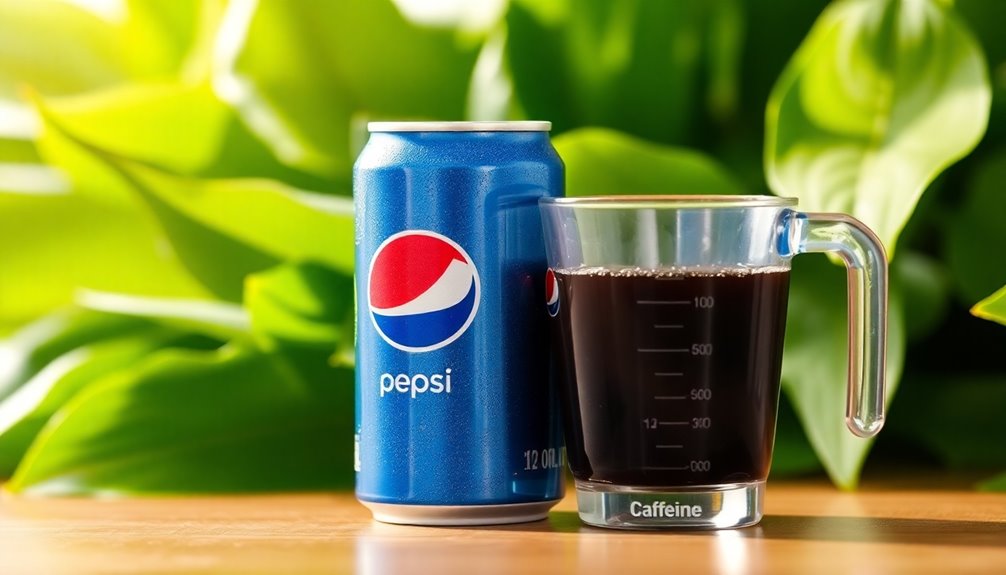
Caffeine intake is a crucial consideration for many, especially for specific populations like pregnant women. The American Dietetic Association recommends you limit your caffeine per day to 300 mg if you're of childbearing potential. This helps mitigate risks of miscarriage and low birth weight.
For the general population, Health Canada suggests a maximum of 400-450 mg daily, but moderation is key to avoid adverse effects. Here are some important guidelines:
- Limit caffeine to under 300 mg if pregnant.
- Be aware that 300 mg can double miscarriage risk.
- The FDA allows 65 mg of caffeine per 12 oz in cola-type beverages.
- Always consider your overall caffeine sources, including sodas and coffee.
Stay informed to make the best choices for your health!
Consumer Awareness of Labels

When you pick up a can of Pepsi, knowing the caffeine content can help you make better choices.
Clear labeling is essential, especially for those sensitive to caffeine. Understanding what's in your drink empowers you to manage your intake effectively.
Importance of Clear Labeling
Clear labeling plays an essential role in empowering consumers to make informed choices about their health.
When you're aware of the caffeine content in your beverages, you can better manage your intake, especially if you have specific health concerns.
PepsiCo's initiative to clearly label caffeine levels, with 25mg per 8 fl oz serving, is a significant step toward enhancing consumer awareness.
This transparency helps you avoid potential health risks associated with excessive caffeine consumption.
- Informed decision-making
- Health management
- Prevention of health risks
- Industry transparency
Understanding Caffeine Content
Understanding the caffeine content in your favorite beverages is essential for making informed choices about your health.
PepsiCo's caffeine labeling initiative reveals that its products contain 25mg of caffeine per 8 fl oz serving. This transparency fosters consumer awareness, enabling you to manage your caffeine intake effectively.
Since caffeine amounts can vary widely—like the 150mg in a 12 oz. cup of coffee—it's vital to read labels and make comparisons. The American Dietetic Association suggests limiting your daily caffeine intake to 300mg, underscoring the significance of understanding caffeine content for your well-being.
The Impact of Caffeine on Health

Caffeine can considerably influence your health, especially considering that most people consume it daily.
While moderate caffeine intake is generally safe, exceeding recommended levels can pose risks. Here's what you should know:
- Regulatory bodies recommend a maximum of 400-450 mg of caffeine per day for healthy adults.
- Pregnant women should limit intake to under 300 mg to reduce risks for their babies.
- High caffeine consumption can lead to anxiety, palpitations, and sleep disturbances.
- Excessive caffeine may result in negative health outcomes, like elevated liver enzymes.
Being aware of your caffeine content is essential for maintaining good health.
Market Trends in Caffeinated Products

As consumer preferences evolve, companies like PepsiCo are adapting by introducing innovative caffeinated products. The cola category has stagnated, prompting a shift towards drinks containing high caffeine content, like Pepsi Café, which boasts nearly double the caffeine of regular soda. This aligns with market trends showing a growing demand for functional beverages. Additionally, the rise of decentralized applications has influenced consumer behavior, leading to increased interest in products that offer unique benefits.
| Product | Caffeine Content | Market Growth |
|---|---|---|
| Pepsi Café | 69 mg per 12 oz | Strong |
| Ready-to-Drink Iced Coffee | Varies | Rapid |
| Energy Drinks | Varies | Consistent Growth |
| Hard Seltzers | Low to Moderate | Surging |
| Coffee Beverages | High | Increasing Demand |
This trend reflects a broader consumer interest in diverse beverage choices, making room for exciting new options.
Pepsi's Caffeine Labeling Initiative

While many consumers are becoming more health-conscious, PepsiCo is taking a significant step forward with its new caffeine labeling initiative. This initiative aims to enhance your awareness about caffeine content in Pepsi products sold in the U.S.
By clearly indicating that there's 25 mg of caffeine per 8 fl oz serving, you'll have better control over your intake. This move aligns with demands from organizations like the American Medical Association for transparency in beverage labeling.
- New labels coincide with a brand redesign
- Focus on transparency in caffeine content
- Responds to consumer demand for clear information
- Proactive measure to address future regulatory concerns
Incorporating clear labeling practices is crucial for fostering informed consumer choices, which can lead to healthier decision-making.
This initiative reflects PepsiCo's commitment to informed consumer choices.
Future of Caffeine in Soft Drinks

With consumer preferences evolving toward beverages that offer more than just refreshment, the future of caffeine in soft drinks looks increasingly promising. You're likely to see more options like Pepsi Café, which boasts nearly twice the caffeine of regular soda. This trend aligns with the growing demand for functional drinks that provide added benefits. As brands disclose caffeine content—like Pepsi's 25mg per 8 fl oz—they're enhancing transparency and empowering you to make informed choices. The FDA's guidelines, recognizing caffeine as generally safe, support innovations in cola beverages. Additionally, the rise of coffee-infused sodas indicates that major players are adapting to the market's desire for higher caffeine content, competing fiercely to capture your interest and taste. Moreover, the incorporation of advertisement cookies allows companies to tailor their marketing strategies around these evolving consumer preferences.
Frequently Asked Questions
Is Pepsi More Caffeinated Than Coke?
You're probably wondering if Pepsi packs more caffeine than Coke. The truth is, they're quite similar in caffeine content.
A 12 oz. serving of Pepsi has around 33.9 mg, while Coca-Cola has about 34 mg.
If you're really looking for a caffeine kick, though, consider Pepsi One, which boasts 57 mg per 12 oz. serving.
What Has More Caffeine, Pepsi or Mountain Dew?
You might be surprised to learn that when it comes to caffeine, not all sodas are created equal.
If you're reaching for a revitalizing drink, you'll find Mountain Dew packs a punch with about 55 mg of caffeine per 12 oz serving, while Pepsi trails behind at around 33.9 mg.
So, if you're looking for that extra boost, Mountain Dew's your best bet.
Who knew your soda choice could impact your energy levels so much?
Which Soda Has the Most Caffeine?
When you're trying to find out which soda has the most caffeine, search no more than Pepsi One.
It packs a punch with 57 mg of caffeine per 12 oz serving. Mountain Dew isn't far behind with 55 mg, making it a strong contender.
If you're curious about other options, Diet Coke has 46.3 mg, while Coca-Cola has 33.9 mg.
You might be surprised to learn that Sunkist even contains 41 mg!
How Much Caffeine Is in a Pepsi?
If you're wondering how much caffeine's in a Pepsi, you'll find that a 12 oz serving contains about 38 mg.
That's less than many other sodas, like Pepsi Zero Sugar, which packs around 69 mg.
It's also considerably lower than a typical cup of coffee, which has around 150 mg.
Conclusion
So, next time you crack open a can of Pepsi, remember: it's not just a fizzy treat; it's a caffeine surprise party! While you're sipping away, ponder the irony of counting caffeine like calories—because why not stress over your caffeine fix when you could be enjoying life's little pleasures? As Pepsi plays with labels, you might just find that the only thing more addictive than caffeine is our obsession with knowing exactly what we're consuming. Cheers!
